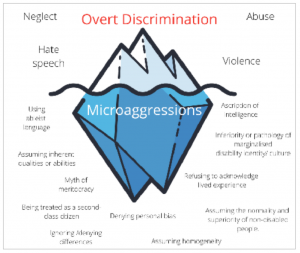Term: microaggression
Situation: when a new employee went through the workplace training booklet and saw the word microaggression.
Parenthetical Definition: everyday, subtle put-downs directed towards a marginalized group which may be verbal or nonverbal and is typically automatic.
Sentence Definition: microaggression is a type of discrimination that is subtle, unintentional discriminatory actions or statements conducted to gainst people of the marginalized groups.
Expanded Definition:
Microaggression is a type of discrimination in which subtle, unintentional discriminatory actions or statements were conducted to gainst people of the marginalized groups. Unlike direct discrimination, microaggression is automatically or unconsciously conducted by people who are unaware of the hidden messages being sent.
Figure 1: The Iceberg Analogy

Note. Adapted from/ Inclusive School Communities – Disability Microaggressions in Education, by Dr. Leanne Longfellow. https://inclusiveschoolcommunities.org.au/resources/toolkit/disability-microaggressions-education
If we compare discrimination to an iceberg, then microaggression is a hidden iceberg. It is usually invisible but still can be hurtful and stigmatizing for minority groups. In Figure 1, the iceberg is split into two parts by a line representing what is shown above water and what is not under the water. The upper part represents overt discrimination, which includes hate speech, violence, abuse, and neglect. The bottom part is labeled as microaggressions which include:
- Assuming inherent qualities or abilities
- The myth of meritocracy
- Being treated as a second-class citizen
- Ignoring/denying differences, denying personal bias
- Assuming homogeneity
- Inferiority or pathology of marginalized disability identity/ culture
- Ascription of intelligence
- Assuming the normality and superiority of non-disabled people
- Refusing to acknowledge lived experience
Where does it come from?
The term Microaggression was first coined by Harvard University psychiatrist Chester M. Pierce in 1970 to describe insults and dismissals which he regularly witnessed non-black Americans inflicting on African Americans. (Delpit, 2012) By the early twenty-first century, the phrase had come to refer to the casual degrading of any socially excluded group, including LGBT people, people with low financial status, and disabled people. (Paludi & Denmark, 2010)
The following questions or statements are examples of microaggression:
- Where are you actually from? (Kohli & Solórzano, 2012)
- You are very competent as a woman
- Your perseverance in the face of disability is truly inspirational to me.
- Oh, you’re gay? You should meet my friend Jane, she is gay too.
Following behaviors or actions are examples of microaggression:
- Assume a person of color is presumed to be dangerous, criminal, or deviant on the basis of their race.
- Assume people with mental illness look/behave a certain way.
- Assume all Asians are good at math.
- Assume people who aren’t in heterosexual relationships are unable to have a family
How to avoid microaggression?
- Think before speaking, think about what is the assumption behind what you would do, and say.
- Consider how your statement and behavior will affect others in a negative way
- Ask yourself if your question or statement is biased.
- Learn more about minority groups, be respectful of their culture and experiences.
In conclusion, even though microaggression is subtle and often neglected, it is still powerful to hurt marginalized people’s feelings, people should be more mindful about what their comments and actions imply.
Citation:
Delpit L (2012). “Multiplication Is for White People”: Raising Expectations for Other People’s Children. The New Press. ISBN 978-1-59558-046-7.
Kohli, R., & Solórzano, D. G. (2012). Teachers, please learn our names!: racial microaggressions and the K-12 classroom. Race Ethnicity and Education, 15(4), 441–462. https://doi.org/10.1080/13613324.2012.674026
Longfellow, L. L. (n.d.). Inclusive School Communities – Disability Microaggressions in Education. Inclusive School Communities. https://inclusiveschoolcommunities.org.au/resources/toolkit/disability-microaggressions-education
Paludi, M. A., & Denmark, F. L. (2010). Victims of Sexual Assault and Abuse [2 volumes]: Resources and Responses for Individuals and Families (Women’s Psychology). Praeger.
Leave a Reply